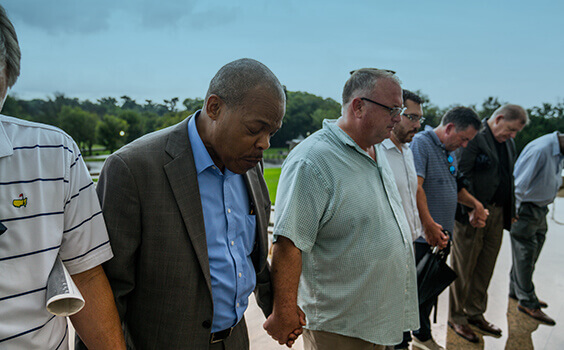By J. Jeff Toler, for Shenandoah Christian Alliance
With some understanding of the history of Marxism in the USA, and particularly with its infiltration into the mainline denominations of the early 20th century, we can begin to see how progressive Christianity became popularized in the 21st century.
Major celebrity figures within the Christian community today seemed to have become, almost overnight, fully woke preachers and teachers. It would seem that it took years for this to happen. If so, no one seemed to be paying much notice. At the very least for many men and women in public ministry, the rhetoric was subtle and gradual, and we dismissed any potential error.
But it is more likely, we were simply not paying attention.
Sound biblical teaching is, and always has been the singular component in developing sound biblical doctrine. It is the bedrock of our sanctification.
We must not confuse this with Justification, which is defined as “an act of God by which those who are unrighteous in themselves are nevertheless declared righteous before God while still in the sinning state.” Justification is a deliverance from the penalty of sin and is a past action for all believers, accomplished by Christ at the cross. (https://www.gotquestions.org/justification-vs-sanctification.html)
- Paul summarizes the concept of justification: “So then as through one transgression [Adam’s sin] there resulted condemnation to all men, even so through one act of righteousness [Jesus’ sacrifice on the cross] there resulted justification of life to all men” (Romans 5:18, NASB).
By contrast, sanctification is not the act of God declaring a person righteous; rather, it is the continual process by which God is actually making a person righteous. Sanctification is the deliverance from the power of sin and is a present and continuous process of believers becoming Christlike, accomplished by the Holy Spirit’s power and presence. Sanctification represents a believer’s victory over the flesh (Romans 7:24–25), the world (1 John 5:4), and Satan (James 4:7).
The ultimate end result of our sanctification is that we will be found in Christ’s image.
- “For those whom He foreknew, He also predestined to become conformed to the image of His Son, so that He would be the firstborn among many brethren; and these whom He predestined, He also called; and these whom He called, He also justified; and these whom He justified, He also glorified” (Romans 8:29–30 NASB).
Justification happens when God declares a guilty sinner to be righteous; sanctification happens when God makes the believing sinner righteous. Simply put, Justification is a singular experience; sanctification is a continual process. Justification releases us from the penalty of sin; sanctification releases us from the power of sin. Both justification and sanctification are components of the believer’s “eternal salvation” (Hebrews 5:9).
So, any process requires at least a few necessary components. In business management training for example, these would include:
Decision… For our discussion we must volitionally determine to believe in Christ, by the effective presentation, comprehensive explanation, and strong guidance of Holy Spirit—our salvation experience.
Input… True and trustworthy information must be explored and studied to continue the development. Trustworthy people with the right aptitude are necessary to share and instruct in this information—Bible study.
Output… How well we do with our decisions and our input will then produce the best, most useful results, or output—our spiritual fruit.
In an age like this, it is evident our decisions, without trusted input, can hinder or hamper our development, and therefore our output. When Jesus admonished Peter to “feed my sheep,” He was preparing Peter for the work of the pastor. So consider then, a pastor exhorting the idea of striving for unity among the church. It may sound good, but, what does the Bible teach about unity?
- There must, indeed, be factions among you, so that those who are approved may be recognized among you. (1 Corinthians 11:19 HCSB)
If we, as true believers, are approved by God, yet unite with those who are not, we will not be recognized as such. In other words, it’s a pretty big deal that there must be factions… Francis Chan’s painful exhortation for unity notwithstanding. It becomes a problem when others in our fellowship insist that we must unite—even if this means compromising when we know we cannot agree. This verse doesn’t say there might be factions, it plainly says there must be factions!
- For I have often told you, and now say again with tears, that many live as enemies of the cross of Christ. Their end is destruction; their god is their stomach; their glory is in their shame. They are focused on earthly things, but our citizenship is in heaven, from which we also eagerly wait for a Savior, the Lord Jesus Christ. (Philippians 3:18-20 HCSB)
A truly redeemed church is united in Christ and nothing more. If the call for unity must necessarily mean moving from this position to be acceptable to the culture, that will only end in compromise and conformity—to this world.
So how then, do we respond to David Platt who says, because we are white, we must “look at the reality of racialization,” and then adds, “I want Christ to be exalted through increasing diversity?” The message is, If we are white, we must be racist. As Voddie Baucham reminds us, for Critical Race Theory crusaders, everything is racist.
If it is not found in the Gospel of Jesus Christ, it is another gospel.
- There is neither Jew nor Gentile, neither slave nor free, nor is there male and female, for you are all one in Christ Jesus. (Galatians 3:28 NIV)
In end times prophesy, Jesus plainly declares ἐγερθήσεται γὰρ ἔθνος ἐπὶ ἔθνος—“nation will rise up against nation.” The Greek word for nation is “ethnos” [a race (as of the same habit), i.e., a tribe] from which we derive ethnic.
Can any race find sanctification in uniting with critical race theory?





